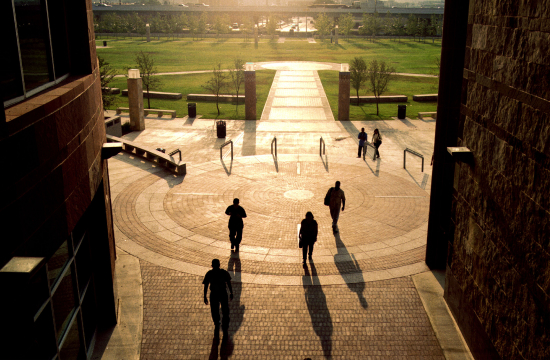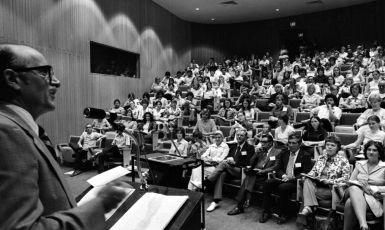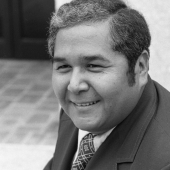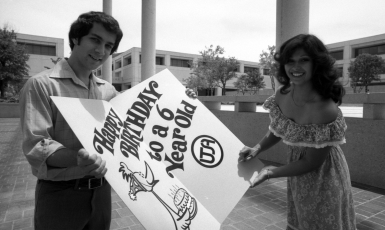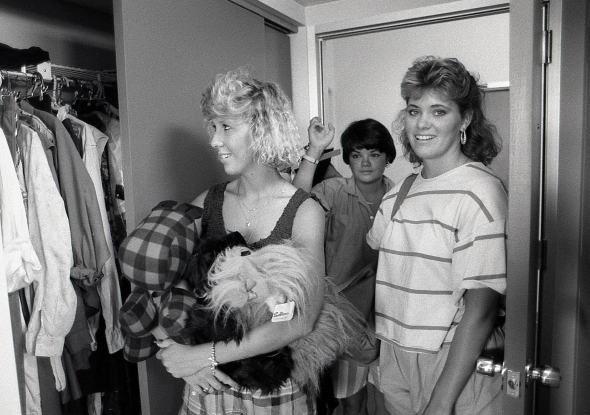UTSA has been serving as a driver of social mobility and economic prosperity for over 50 years. The university was born at a ceremony held in front of the Alamo on June 5, 1969. This symbolic start, linking the new university to the community it serves, is one of many reasons that UTSA is unique.
Prior to 1969, San Antonio lacked a public four-year higher education institution. Seeking to address high demand for local, high quality educational opportunities, a combination of Mexican-American community activists, San Antonio business leaders and political champions came together to create a university of the community, by the community and for the community.
From its first graduating class of 82, to the nearly 35,000 students enrolled today, UTSA has grown into San Antonio's university and serves as a symbol of the city's upward trajectory.
Much like the city of San Antonio, UTSA has experienced tremendous growth over the years.

Knowing that the next University of Texas campus would be in San Antonio, university leadership looked for spacious sites that provided plenty of room for future growth. Sites across San Antonio were considered, from the city's south side to the heart of downtown. Eventually leaders chose a 600-acre site at what is now the intersection of Interstate 10 and Highway 1604. Initially surrounded by farmland and fields, UTSA's Main Campus spurred the city's northward economic development progress, and set the stage for other major developments to locate in the area including USAA's headquarters, the medical center and UT Health San Antonio.
In 1970, campus began to take shape. Lead architect O'Neil Ford created a campus design based on an old European city, with a central plaza and courtyard connected by ‘paseos’ – plazas and walkways for strolling. To help campus architecture blend in with the existing landscape, ‘Texas concrete’ was used, a variation of the building material with a soft beige color. Carefully planned landscaping included live oak trees to shade students in the summer and leaf-shedding red oaks. By 1976, construction of UTSA's Main Campus was complete and Roadrunners had an official home.
Initial size of campus
Size of first graduating class
Initial number of teachers
The first faculty, staff and students helped shape UTSA and set the stage for its future. Early faculty included Tomás Rivera, a Chicano author, poet, and administrator who championed social mobility though education; Jacinto Quirarte, one of the first art historians to focus on Chicano art; Álbar Peña, a bilingual educator and founder of the National Association for Bilingual Education; and Richard Adams, an archaeologist specializing in Mesoamerican and Mayan civilization.
Tomás Rivera
Jacinto Quirarte
Álbar Peña
Richard Adams
The year 1968 proved to be an important milestone for the City of San Antonio, as it marked the 250th anniversary of the city's founding in 1718. To celebrate, the community hosted the World's Fair, a six-month experience referred to as HemisFair. The event brought about some of San Antonio's most familiar landmarks, including the Institute of Texan Cultures (ITC), which highlights the cultural traditions, stories and history that makes up Texan culture. In 1973, the ITC became part of UTSA, and the university is currently envisioning what the next 50 years holds for this important Texas resource.
UTSA hosted an election to determine a school mascot in what was to be a major milestone for the university. Many choices were considered, including the armadillo, stars, eagle, jaguar, roadrunner, puma, toro ('bull') and vaquero ('cowboy'). The armadillos and stars won the election, knocking the roadrunner from contention. However, a voided election forced a second vote, and the roadrunner staged a surprising comeback. On December 12, 1977 the roadrunner officially became UTSA's mascot.
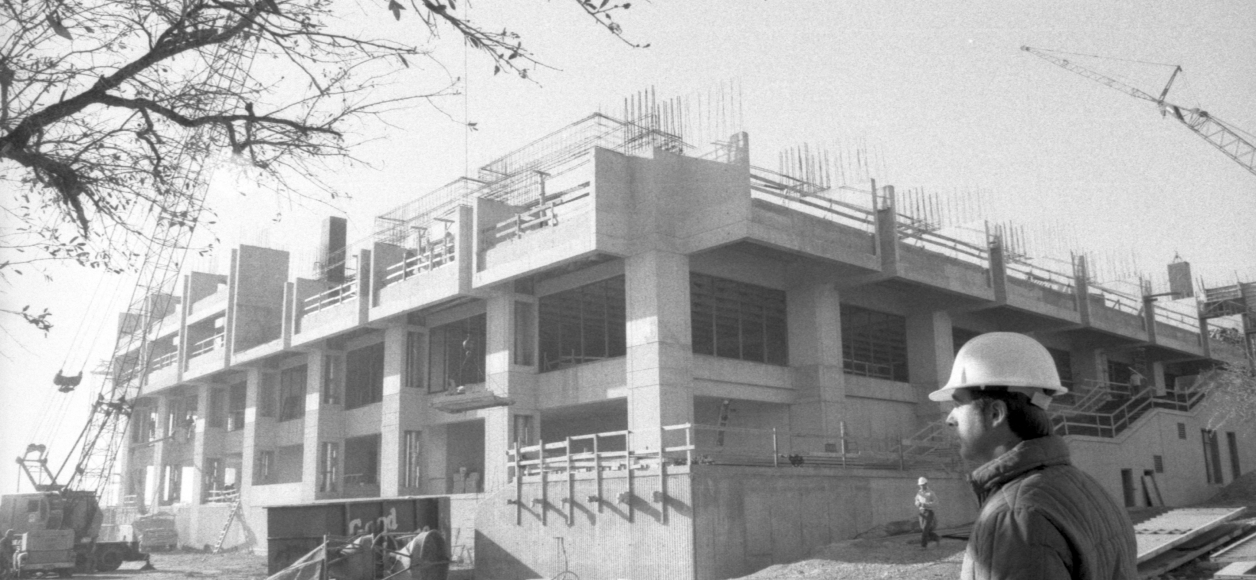
UTSA's expansion during the 1980's involved a deepening identity, due to a growing number of graduates, sports, traditions and student life opportunities. One of the hallmarks of the college experience is cheering for college athletics. In 1981, UTSA welcomed its first sport to campus: track and cross country. That same year, UTSA basketball played its first season, cheered on by a growing number of UTSA students and alumni as well as the school's mascot, Rowdy the Roadrunner.
One of the largest changes to campus life occurred in 1986 when the first residence hall, Chisholm Hall, opened. This new building not only gave on-campus students a broader college experience with regular social events, including dances, mixers, and movies, but also signaled UTSA's transition from a 'commuter school' to one offering a traditional residential campus home.
By the 1990's, UTSA had been serving students and the larger San Antonio community for 25 years. With an eye on the next quarter century, UTSA turned its sights on expanding the resources that would accommodate its growing student population and research efforts.
In 1995, bulldozers started to roll across what would be one of UTSA's largest developments since its founding, a new 18-acre Downtown Campus. The Downtown Campus began as a need to provide an advanced four-year public education institution situated in the heart of San Antonio for the multi-cultural communities of South Texas. The city wanted to offer its urban population an opportunity to fulfill their educational dreams without having to travel outside of Loop 410. To address this absence, Bill Miller Bar-B-Q Enterprises, Inc. bought and gifted property between West Durango Boulevard and Buena Vista Street for the construction of the downtown campus. By 1997, the Downtown Campus officially opened with four academic buildings.
Explore UTSA's downtown presence
Other facility developments soon emerged, as did Roadrunners' innovative research and educational successes. In 1996, the university's first two PhDs were awarded in biology with a specialty in neurobiology. That same year, the Student Union completed a major expansion, which included a bookstore, student activities complex, and the Retama auditorium.
UTSA was founded with the intention to advance the education of Mexican Americans and other underserved populations. Building on this commitment, UTSA continues to position Hispanic students, staff and faculty for growth, leadership and success. In 1994, UTSA was designated by the U.S. Department of Education as a Hispanic Serving Institution and in 2020 received the Seal of Excelencia, a national certification recognizing leadership in advancing Latino student success.
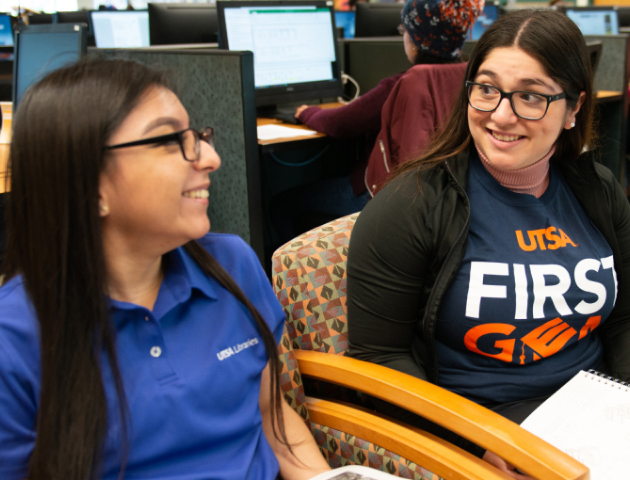

Throughout the years, one of the defining characteristics of the downtown campus has been its eye-catching architecture. This is no accident; building architect Humberto Saldaña & Associates developed a plan to functionally and aesthetically connect the campus design to San Antonio's core. The choice of building material fabric for the three buildings - native limestone, red granite, brick, sandstone, and glazed tiles – is intended to reflect design elements of some of San Antonio's most significant buildings and connect the campus to the diverse neighborhoods throughout the city.
The 2000's – leading up to present day – have been marked by UTSA leadership in research, athletics, and plans for the future. In 2009, the Texas Legislature passed Proposition 4, designating UTSA as an emerging research university and paving the path toward attaining the prestigious Carnegie R1 classification in 2022. Outside the classrooms and labs, UTSA's campus life continued to develop, offering new opportunities for Roadrunners to lead the way. In 2011, UTSA Athletics took a major leap forward when the first Roadrunner football team took to the field, cheered on by a sea of fans wearing orange, blue, and white.
One of the most recent series of leadership steps taken have revolved around plans for the Downtown Campus. In 2017, the campus celebrated its 20th anniversary in a ceremony overseen by the then newly appointed UTSA President Eighmy. At the event, Eighmy announced a new vision for the future of the Downtown Campus, imagining it as a model urban-serving university and discussing plans to broaden the UTSA Downtown Campus' footprint. In support of this initiative, Graham Weston provided a $15 million gift for construction of a new School of Data Science and National Security Collaboration Center. These facilities now serve as a major connector between the university and the local community.
Once regarded as a regional commuter school, UTSA has transformed into a Tier One research powerhouse and national model for student success in just a few short years. With a focus on experiential learning and bolstering San Antonio's economy through innovative partnerships, UTSA is setting new standards for excellence in public higher education.
Looking forward to the next decade and beyond, UTSA is committed to expanding its national leadership in preparing career-ready students while driving economic prosperity for our region. Ultimately, the history and developmental story of UTSA is highlighted by our commitment to students, the larger San Antonio community, and a bold future.
